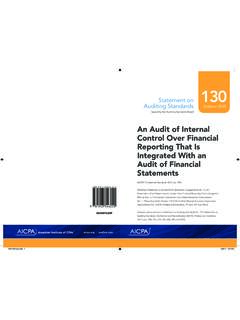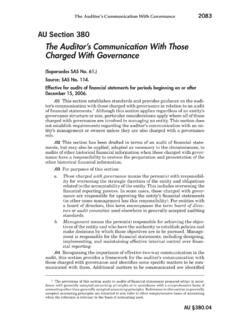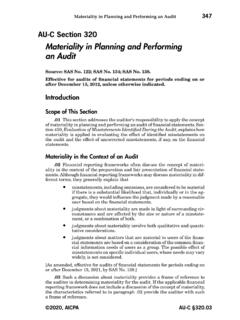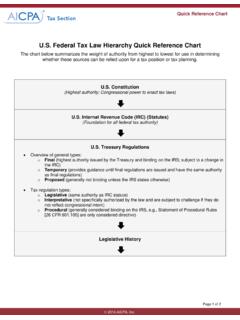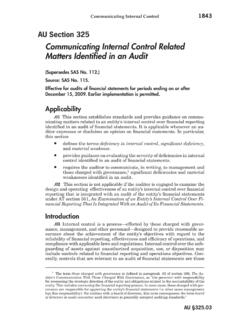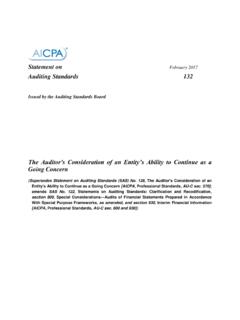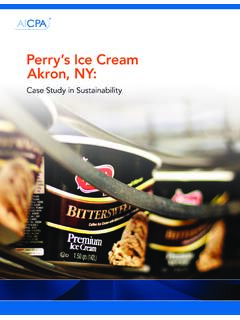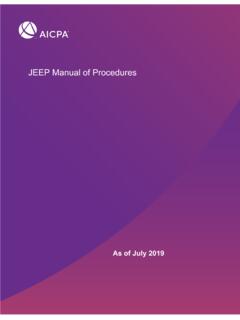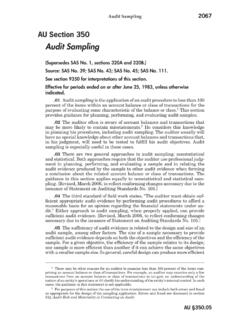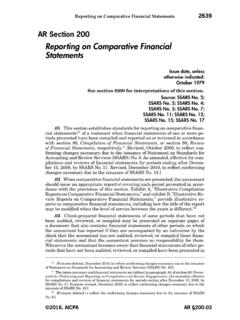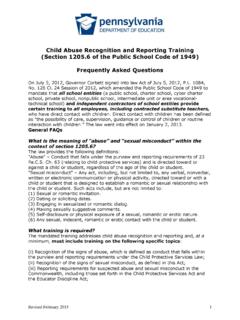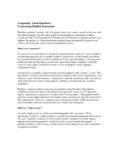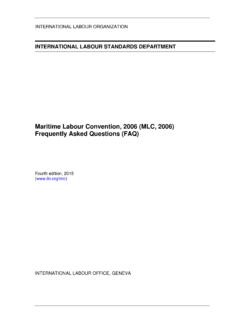Transcription of Frequently Asked Questions - AICPA
1 Frequently Asked Questions : Nonattest services As of January 31, 2020 AICPA Professional Ethics Division 2 Introduction The answers to these Frequently Asked Questions (FAQs) are based on guidance the AICPA Professional Ethics Division staff provided in response to members inquiries concerning the interpretations of the Nonattest Services subtopic (ET sec. ) of the Independence Rule (ET sec. ) of the AICPA Code of Professional Conduct (code). The FAQs are not rules or interpretations of the Professional Ethics Executive Committee and, therefore, are not considered authoritative guidance. Further, the answers do not address the requirements of other standard-setters or regulatory bodies, such as the state boards of accountancy, the SEC, and the Government Accountability Office, whose positions may differ from those of the AICPA .
2 In applying the following FAQs, members should comply with all applicable interpretations of the Nonattest Services subtopic including, but not limited to, the "General Requirements for Performing Nonattest Services interpretation (ET sec. ), as well as, where applicable, the Conceptual Framework for Independence interpretation (ET sec. ). Terms that are defined in the code appear in italic. The first time a defined term or citation to the code appears in an FAQ, it will be hyperlinked. The date the FAQ was added to this document or revised appears in brackets at the end of the answer. The statement Added prior to June 2005 means that the FAQ was added between May 2004 and May 2005. For conforming edits (for example, revised citations for the Ethics Codification Project), the dates when those edits were made to the FAQ are not identified.
3 Copyright 2019 American Institute of Certified Public Accountants, Inc. New York, NY 10036-8775 All rights reserved. For information about the procedure for requesting permission to make copies of any part of this work, please email or call (978) 750-8400. Otherwise, requests should be written and mailed to Permissions Department, 220 Leigh Farm Road, Durham, NC 27707-8110 USA. 3 Table of contents Routine activities .. 4 Period of impairment .. 4 Suitable skill, knowledge, and/or experience .. 5 Documentation requirement .. 9 Bookkeeping services ..12 Controllership services ..15 Tax services ..15 Information technology services ..17 Appraisal, valuation, and actuarial services ..17 Training services ..18 Project management services ..18 Cybersecurity services ..19 Hosting services ..20 4 Routine activities 1.
4 A member is not required to apply the safeguards in paragraph .01 of the General Requirements for Performing Nonattest Services interpretation (ET sec. ) or comply with the Documentation Requirements When Providing Nonattest Services interpretation (ET sec. ) when performing certain routine activities. Which activities are considered to be routine for purposes of these interpretations? Whether an activity is routine or not should be determined by considering all facts and circumstances related to the activity. Routine activities generally involve providing advice or assistance to the client on an informal basis as part of the client-member relationship. Routine activities are typically insignificant in terms of time incurred or resources expended and generally do not result in a specific project or engagement or in the member producing a formal report, deliverable, or other formal work product.
5 Examples of routine activities include the following: Responding to an attest client s Questions on tax matters Providing advice to the attest client on routine business matters Educating the attest client on matters within the technical expertise of the member Providing information to the attest client that is readily available to the member, such as generally available best practices [Added prior to June 2005] Period of impairment 1. What would be an example of how to apply the exception found in paragraph .03 of the Scope and Applicability of Nonattest Services interpretation (ET sec. )? Consider the following facts and circumstances: In January 20X5, a member is engaged by a nonattest client to close the client s December 31, 20X4 books and records. In providing the services, the member performs certain bookkeeping activities, such as coding journal entries that are considered management responsibilities.
6 The entity s 20X4 financial statements were audited by another firm, which issued an unqualified audit opinion in March 20X5. In September 20X5, the nonattest client asks the member to perform the audit of its financial statements as of and for the year ended December 31, 20X5. Although the nonattest services provided by the member would impair independence, because (a) the nonattest services were provided prior to the entity becoming an attest client ( , prior to the period of the professional engagement); (b) the nonattest services were related to the 20X4 financial statements ( , prior to the period covered by the 20X5 financial statements); and (c) the 20X4 financial statements were audited by another firm, all the criteria would be met. Therefore, independence would not be impaired for purposes of performing the 20X5 audit of the entity s financial statements.
7 [Added November 2015] 5 Suitable skill, knowledge, and/or experience 1. What does suitable skill, knowledge, and/or experience mean in the context of the interpretations of the Nonattest Services subtopic (ET sec. )? Suitable skill, knowledge, and/or experience means that the individual designated by the attest client to oversee the nonattest service has the ability to understand the nature, objective, and scope of the nonattest service. Overseeing the service does not require that the individual designated by the attest client must supervise the member in the day-to-day rendering of the services. The requirement for an individual designated by the attest client to possess suitable skill, knowledge, and/or experience does not, however, require that the individual possess the expertise to perform or re-perform the services.
8 Rather, the individual should agree on the nature, objective, and scope of the services; receive periodic progress reports when appropriate; make all significant judgments; evaluate the adequacy and results of the service; accept responsibility for the service results; and ensure that the resulting work product meets the agreed-upon specifications. The skill, knowledge, and/or experience needed will vary depending on the nature of the nonattest service. For example, the skill, knowledge, and/or experience needed to oversee a payroll service may significantly differ than the skill, knowledge, and/or experience needed to oversee a complex tax service. [Added prior to June 2005] 2. Is the requirement that the individual designated by the attest client possess suitable skill, knowledge, and/or experience to oversee the nonattest services provided by the member new to the AICPA code?
9 No. The code has historically required that attest client management or a management designee undertake certain responsibilities in connection with the member s delivery of nonattest services. For example, at various times, the code has called for the attest client to be sufficiently knowledgeable, sufficiently informed, and have an informed judgment on the results of the nonattest service. These requirements necessitate oversight by an individual with suitable skill, knowledge, and/or experience. [Added prior to June 2005] 3. Why do the interpretations of the Nonattest Services subtopic require an individual who possesses suitable skill, knowledge, and/or experience to oversee the nonattest services provided by the member? If the individual designated by the attest client does not possess suitable skill, knowledge, and/or experience to oversee the nonattest service, there would be no one (other than the member) to make the significant judgments that become necessary during the delivery of the service or discharge the other responsibilities required to be performed by client management (or a designee) as required by the Management Responsibilities interpretation (ET sec.)
10 Of the Nonattest Services subtopic. Accordingly, the management participation and self-review threats would be so significant if the member performs those activities that independence would be impaired. [Added prior to June 2005] 6 4. Which factors should a member consider in determining whether the individual designated by the attest client to oversee the nonattest service possesses suitable skill, knowledge, and/or experience? In assessing whether the individual designated by the attest client has suitable skills, knowledge, and/or experience to oversee a nonattest service, the member might consider the following factors as they pertain to the individual: Understanding of the nature of the service Knowledge of the attest client s operations Knowledge of the attest client s industry General business knowledge Level of education Position at the attest client Some factors may be given more weight than others, depending on the nature of the service.
